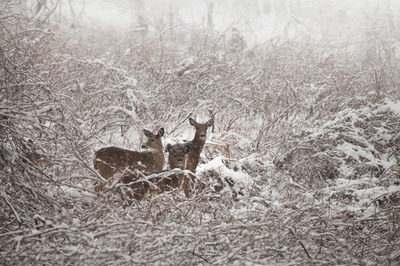Wisconsin DNR Asking Residents to Avoid Feeding Deer as Cold Weather Continues
Wednesday, March 22nd, 2023 -- 8:01 AM

The Wisconsin Department of Natural Resources (DNR) is asking the public to avoid feeding deer as cold winter weather continues around parts of the state.
While the public may be concerned about the impact of winter conditions on the deer population, supplemental feeding of deer, such as leaving corn and other feed out for them in your backyard, causes more harm than good.
Deer are well-adapted to survive in winter conditions, with a slower metabolism in cold months and adjustments in their gut microbiomes to adapt to winter food sources. Corn, alfalfa and other feed are not part of their natural winter diet and can cause severe digestive issues and even death.
Even a single feeding can cause rumen acidosis, which can cause death in otherwise healthy deer. In addition to becoming sick after eating inappropriate food, winter feeding can negatively impact deer in several other ways.
Feeding can draw them out of their winter range where naturally available food and shelter are nearby, causing them to expend more energy than necessary. It also causes deer to congregate, which increases the risk of disease transmission, including chronic wasting disease (CWD).
The risks to the deer population associated with supplemental feeding outweigh any temporary perceived benefits to individual deer. Creating and improving habitat is a more sustainable long-term solution to give deer and other wildlife the resources they need during the summer months and support them during the cold and snowy winter season.
Various resources are available to help landowners improve their land for wildlife, including the Deer Management Assistance Program, the Wisconsin Young Forest Partnership and the Landowner Incentive Program.
Deer feeding is currently illegal in more than three-quarters of Wisconsin counties. Where it is legal, regulations restrict the location and amount of food that may be placed. For a full list of wildlife feeding regulations and counties where feeding is allowed, visit the DNR’s baiting and feeding webpage.
Feel free to contact us with questions and/or comments.




